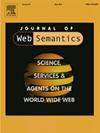Agreeing and disagreeing in collaborative knowledge graph construction: An analysis of Wikidata
IF 3.1
3区 计算机科学
Q3 COMPUTER SCIENCE, ARTIFICIAL INTELLIGENCE
引用次数: 0
Abstract
In this work, we study disagreements in discussions around Wikidata, an online knowledge community that builds the data backend of Wikipedia. Discussions are essential in collaborative work as they can increase contributor performance and encourage the emergence of shared norms and practices. While disagreements can play a productive role in discussions, they can also lead to conflicts and controversies, which impact contributor’ well-being and their motivation to engage. We want to understand if and when such phenomena arise in Wikidata, using a mix of quantitative and qualitative analyses to identify the types of topics people disagree about, the most common patterns of interaction, and roles people play when arguing for or against an issue. We find that decisions to create Wikidata properties are much faster than those to delete properties and that more than half of controversial discussions do not lead to consensus. Our analysis suggests that Wikidata is an inclusive community, considering different opinions when making decisions, and that conflict and vandalism are rare in discussions. At the same time, while one-fourth of the editors participating in controversial discussions contribute legitimate and insightful opinions about Wikidata’s emerging issues, they respond with one or two posts and do not remain engaged in the discussions to reach consensus. Our work contributes to the analysis of collaborative KG construction with insights about communication and decision-making in projects, as well as with methodological directions and open datasets. We hope our findings will help managers and designers support community decision-making and improve discussion tools and practices.
协同知识图谱构建中的同意与不同意:基于维基数据的分析
在这项工作中,我们研究了围绕Wikidata(一个构建维基百科数据后端的在线知识社区)讨论中的分歧。讨论在协作工作中是必不可少的,因为它们可以提高贡献者的绩效,并鼓励共享规范和实践的出现。虽然分歧可以在讨论中发挥富有成效的作用,但它们也可能导致冲突和争议,从而影响贡献者的福祉和他们参与的动机。我们想要了解这种现象是否以及何时在维基数据中出现,使用定量和定性分析的混合方法来确定人们不同意的主题类型、最常见的交互模式以及人们在争论或反对某个问题时所扮演的角色。我们发现创建Wikidata属性的决定比删除属性的决定要快得多,而且超过一半的争议性讨论没有达成共识。我们的分析表明,维基数据是一个包容的社区,在做决定时考虑不同的意见,在讨论中很少出现冲突和破坏行为。与此同时,虽然有四分之一的编辑参与了有争议的讨论,对维基数据出现的问题提出了合理而有见地的意见,但他们只回复了一两个帖子,并没有继续参与讨论以达成共识。我们的工作有助于通过对项目中的沟通和决策的见解,以及方法方向和开放数据集来分析协作KG建设。我们希望我们的发现能够帮助管理者和设计师支持社区决策,并改进讨论工具和实践。
本文章由计算机程序翻译,如有差异,请以英文原文为准。
求助全文
约1分钟内获得全文
求助全文
来源期刊

Journal of Web Semantics
工程技术-计算机:人工智能
CiteScore
6.20
自引率
12.00%
发文量
22
审稿时长
14.6 weeks
期刊介绍:
The Journal of Web Semantics is an interdisciplinary journal based on research and applications of various subject areas that contribute to the development of a knowledge-intensive and intelligent service Web. These areas include: knowledge technologies, ontology, agents, databases and the semantic grid, obviously disciplines like information retrieval, language technology, human-computer interaction and knowledge discovery are of major relevance as well. All aspects of the Semantic Web development are covered. The publication of large-scale experiments and their analysis is also encouraged to clearly illustrate scenarios and methods that introduce semantics into existing Web interfaces, contents and services. The journal emphasizes the publication of papers that combine theories, methods and experiments from different subject areas in order to deliver innovative semantic methods and applications.
 求助内容:
求助内容: 应助结果提醒方式:
应助结果提醒方式:


